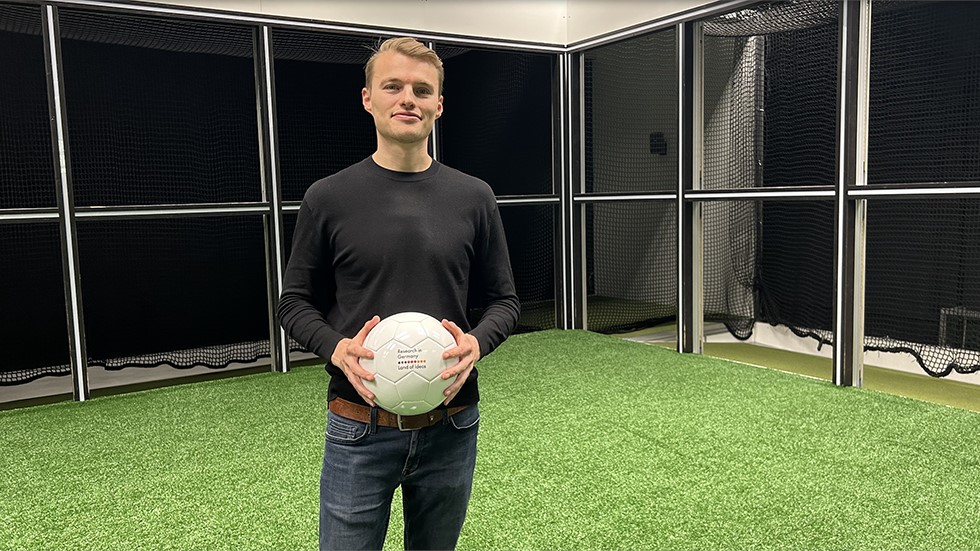Support making RiG more international!
Click here to start the surveySupport making "Research in Germany" more international! Your expertise and commitment are the key to the further development of promoting the German research landscape. We invite you to take part in our online survey and share your valuable experiences and opinions. Duration: 7-10 min.
Please start the survey at the end of your visit.
“TSG Hoffenheim excels in understanding how psychological aspects impact performance”
Adam Beavan is Coordinator of Science & Innovation at the German top-league club TSG Hoffenheim. He is researching how cognitive training techniques can help improve physical performance. In this interview, Adam talks about how to train the brain, Hoffenheim’s role in football research, and why you should consider doing research in Germany.

Before coming to Germany, you lived in Sydney. What factors influenced your decision to move to Saarbrücken?
I moved from Sydney to Saarbrücken for work opportunities in football, which were more abundant in Germany than in Australia. The advanced level of football in Germany, as the World Cup holders at the time, made it an ideal place to further my career. Studying at Saarland University and having a collaboration with the Bundesliga club TSG Hoffenheim, made the move worthwhile. The football scene in Germany offers too many opportunities and is too exciting to consider leaving.
Overall, I highly recommend doing research in Germany to anyone considering moving overseas. Being in the heart of Europe makes it easy to travel to nearby countries such as France and Italy, while still being able to focus on your studies. My decision to pursue my PhD in Germany has allowed me to explore Europe while advancing my education and career over the past six years.
You have completed your PhD at Saarland University focusing on perceptual and cognitive training in football. Can you elaborate on this?
When I first moved to Germany, it was important to me that Saarland University had a connection with Bundesliga club TSG Hoffenheim, a pioneer in sports psychology in Germany and beyond. Hoffenheim excels in understanding how psychological aspects impact player performance on and off the field. This unique approach provided a new perspective during my PhD, where I focused on measuring athletes’ executive functions. These cognitive skills are crucial for prioritising and planning our behaviour to achieve the goals we set. My research aimed to determine if executive functions could be a performance indicator for decision-making on the field. While it’s not always true that those with the best executive functions are the best football players, high-performance athletes tend to excel in these cognitive tasks compared to others.
What are your current research questions as Coordinator of Science & Innovation at TSG Hoffenheim?
We are working towards solving this complex question: How to effectively train someone on a task that translates to football performance? It remains a mystery how to truly train the brain on specific tasks and ensure it improves football skills. Additionally, determining if cognitive training directly impacts performance improvement is challenging due to other factors like coaching and personal development.
What we also do is trying to understand how all the data on an athlete can communicate to develop them further. An athlete undergoes performance diagnostics measuring various aspects of their body and physiology. But it’s also important to consider the psychological aspect: decision-making, mental fatigue, team synchronisation. At the highest level, tactics and psychology can be the differentiating factors between winners and losers. My role is to build a platform for this data to interact and create tailored programmes for athlete development.
Why is TSG Hoffenheim taking on a pioneering role in research and innovation?
TSG Hoffenheim is remarkably open for conducting scientific projects and collaborating with others, leading the way in driving innovation in football clubs. The TSG ResearchLab is a newly founded, independent research institution associated with Hoffenheim that conducts joint research projects together with the club. The ResearchLab pursues non-profit purposes for the promotion of science and research, the promotion of education, national and professional training including student aid, the promotion of youth welfare and sports. This commitment to transparency and collaboration reflects the philosophy of both Dietmar Hopp, the club owner, and the club itself. My time at the ResearchLab was incredibly rewarding, as I had the opportunity to work on exciting scientific projects and was able to successfully publish my findings. Hoffenheim’s willingness to be open to science showcases its dedication to openness and furthering education of others.
What future research areas are you interested in exploring or tackling?
Apart from traditional cognitive assessments and cognitive training research, I have also delved into the topic of air pollution in football out of pure interest. Despite Germany’s reputation for good air quality, our research has shown that even in local regions like Hoffenheim, air quality can reach hazardous levels that impact both the physical and psychological well-being of players. This “hidden killer” can lead to symptoms like breathing difficulties and decreased performance during training sessions and games. Coaches and medical staff should consider air pollution as a potential factor when evaluating player health and performance. Our data from both the under-19 team and the female professional team show clear impacts on players performance and well-being when pollution levels are high, even in one of Germany’s least polluted regions.
One last question: Since Australia is not participating in the European Championship, which team will you be cheering on?
If Germany are playing, I would of course support them as the home team. A comeback for them would boost football in Germany and reassure the fans that we are on the right path of winning again.